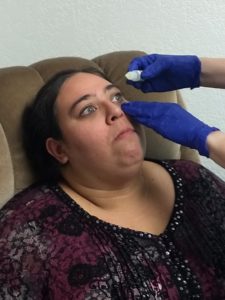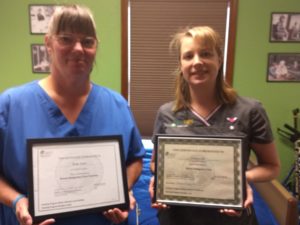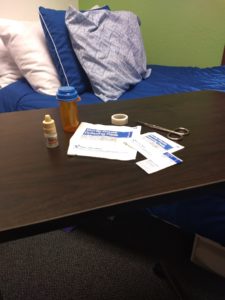Imagine this scenario: an elderly patient has prescription eye drops that he needs to take twice a day. While he’s still relatively mobile and functioning, his home care provider can hand him the bottle and he can administer them himself. But what if his condition declines suddenly? That same home care provider has no authority to squeeze the eyedrops out of the bottle and in to his eye. Instead, at considerable cost and inconvenience, a nurse or home health practitioner needs to come in, just to perform this simple action.

Sound extreme? Events like this occur every day with patients who fall in the gap between functioning independently and needing support. “There’s a line we’re not allowed to cross that requires nurse supervision,” says Sarah Lane, owner of FirstLight Home Care in Olympia. “There’s a small window of actions that don’t require home health and the patient doesn’t need to go to a facility, but they’re beyond the scope of what we’re allowed to do on our own.”
To solve this challenge, Lane is collaborating with Kristy Danforth of Olympia Nursing Services to provide nurse delegation for her staff. Under Danforth’s supervision, once they’ve completed training and certification, employees can perform certain tasks for clients that would normally be beyond their scope. “It allows people to stay with home care when they need just a little bit of extra services,” says Lane.
Tasks fall into three main categories: medication management, bandage changes, and catheter and ostomy care. “Normally we’re allowed to do medication assistance, which means reminding people to take their medications,” says Lane, “but we can’t fill up their weekly medication box, administer prescriptions like lotions or eye drops, or make decisions about how often to give them morphine for pain control, particularly at the end of life.”

For patients recovering from surgery or who’ve fallen and hurt themselves, home health nurses might come to change a bandage twice a week. The problem? “Most of those bandages need to be changed every day,” says Lane. “Now, as long as a nurse oversees us, we can do it.” Similarly, under normal circumstances, home care providers can empty an ostomy bags but not change it. Nurse delegation allows them to take that extra step.
Danforth meets with clients and their families to determine each task FirstLight providers might need to perform. Then she trains every staff member who will be working with that client on each task for that person. “It’s customized to reduce any chance of error,” says Lane. “For example, the instructions for how to administer eye drops for one client might be different from another’s, they are written specifically for each client and their needs.”
FirstLight staff can call Danforth at any point with questions, and she provides them with a binder describing each procedure, step by step. “Kristy is available any time,” says Lane. “The instructions are also right there.”
Communication is key, according to Danforth. “I make it very clear to my caregivers that I cannot do nurse delegation efficiently unless I get good communication,” she says. “They need to know what I expect to be called about, what to call the doctor for and when to call hospice or 911. It’s about getting enough training in place so they clearly know who to call when there’s a problem.”

Having a nurse delegate in place saves clients considerable cost and inconvenience and maintains a continuity of care. Instead of paying a substantial fee for medical staff, they can spend a couple extra dollars an hour for FirstLight staff to perform a nurse delegation task. When cost is a factor, families often choose to provide these tasks themselves, but with nurse delegates, they can leave that responsibility to professionals. “It allows family members to just be family members,” says Lane. “While they’re visiting, they’re reminiscing and treasuring moments instead of thinking, ‘I’m sorry dad, but I have to wake you up every two hours for your pain medication.’ We can do that.”
Continuity of care is also important. “Especially in hospice situations, you don’t know how much time that person has left,” says Lane. “To make a change in caregivers at such a critical time would be really hard.”
According to Danforth, FirstLight was a good candidate for nurse delegation because the caregivers are very well trained. “They may be new to nurse delegation, but they certainly have their Nursing Assistant level training down very well,” she says. “Their caregivers are very empathetic, caring individuals and they’re exceptionally attuned to what the client needs.”
Nurse delegation is common in facilities and adult family homes, but less so in home care. “FirstLight has the drive and inclination because they saw the real need for this service,” says Danforth. “That’s a direction I’m encouraged by.”
Learn more by visiting the FirstLight Home Care website or by calling 360-489-1621.
Sponsored




















































